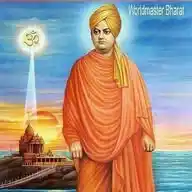
Worldmaster Bharat Mission
February 15, 2025 at 05:56 PM
February ,12/2025
*Swami Dayanand Saraswati: The Creator of Modern Sanatan Ideology*
12 February, 1824-30 October, 1883
Swami Dayanand Saraswati: The Creator of Modern Sanatan Ideology
Swami Dayanand Saraswati was a prominent Sanatan reformer, philosopher and founder of the Arya Samaj, a socio-religious organisation that aimed to revive Vedic traditions and eradicate superstitions from Indian society. His ideas played a key role in shaping the modern Sanatan ideology and inspired many nationalist movements in India.
Born on 12 February, 1824 in Tankara, Gujarat, Mool Shankar Tiwari was raised in a devout Brahmin family. From an early age, he demonstrated sharp intellect and deep religious instincts. His father, a wealthy and orthodox Brahmin, introduced him to the worship of Lord Shiva and the study of scriptures. However, a pivotal moment in his life came when he saw rats running over the idol of Shiva during a jagran in a temple. This deeply disturbed him, causing him to question idol worship and spurring a search for spiritual truth.
Determined to attain enlightenment, Moolshanker left his home at the age of 21 and traveled throughout India, studying under various scholars and sages. He eventually became a disciple of Swami Virajananda, a blind but highly learned Vedic scholar, who guided him in mastering the scriptures. It was Virajananda who inspired him to devote his life to reviving the lost knowledge of the Vedas. Changing his name to Swami Dayananda Saraswati, he embarked on a mission to restore Vedic teachings and free the Sanatana Dharma from corrupt practices.
In 1875, Swami Dayananda founded the Arya Samaj in Mumbai, with the aim of reforming the Sanatana society by returning to Vedic principles. He opposed idol worship, caste-based discrimination, child marriage, untouchability, and superstitions that had crept into Sanatana practices over the centuries. Instead, he advocated rationalism, equality, and education for all, including women – a revolutionary stance at the time.
His most influential work, "Satyarth Prakash" (Light of Truth), was published in 1875. In this book, he criticised prevalent religious practices, including superstitions and rituals, and provided logical explanations of the Vedas. He also promoted 'shuddhi' (re-conversion) for those who had left Sanatan Dharma, aiming to bring them back to Vedic traditions.
Swami Dayanand's teachings had a far-reaching impact on India's social and political awakening. He was among the first to advocate swaraj (self-rule), which later influenced leaders such as Bal Gangadhar Tilak and Mahatma Gandhi. He emphasised education, self-reliance and national pride, urging Indians to reject foreign influences and rediscover their heritage.
He also played a role in the modernisation of education by promoting gurukuls (Vedic schools), which combined traditional knowledge with modern subjects. Later, institutions such as the DAV (Dayanand Anglo-Vedic) School and College were established based on his vision.
His reformist activities attracted both admirers and detractors. In 1883, he was reportedly poisoned by a cook employed by his opponents while staying at a king's palace in Jodhpur. Despite medical aid, he died on October 30, 1883.
His contributions continue to inspire millions. The Arya Samaj movement is active around the world, promoting education, social reform and Vedic teachings. Swami Dayanand's legacy as a fearless reformer, philosopher and visionary endures in the cultural and intellectual landscape of modern India.
